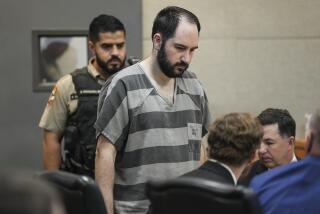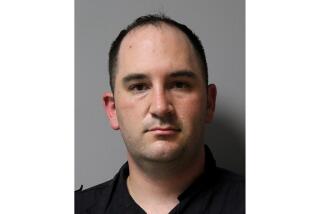U.S. Soldier Pleads Guilty in ‘Mercy’ Killing of Iraqi
- Share via
BAGHDAD — A U.S. Army staff sergeant who shot an unarmed, wounded Iraqi teenager to put the youth “out of his misery” pleaded guilty to murder Friday and was sentenced to three years in prison.
Staff Sgt. Johnny Horne Jr., 30, admitted that he killed Qassim Hassan, 16, after his unit attacked a group of Iraqis on Aug. 18 in the Baghdad slum of Sadr City. Horne said the teenager was so badly wounded that he would have died anyway.
“I wanted to end his suffering,” Horne said during a court-martial trial in Baghdad. “With my weapon I fired a shot to his head. His attempts to breathe ceased.”
U.S. military prosecutors did not call any of Hassan’s relatives or Iraqis to testify Friday at the trial and sentencing hearing. In interviews with The Times in October, family members, including people who witnessed the shooting, said that Hassan’s wounds were not serious and that his life could have been saved with medical attention.
Horne pleaded guilty to one count of murder and one count of conspiracy to commit murder. The plea agreement ensured that his sentence would be no more than 10 years.
A seven-member military panel deliberated about four hours before passing sentence. Horne was also reduced in rank to private, ordered to forfeit pay and given a dishonorable discharge.
He is among five U.S. soldiers from the 1st Battalion, 41st Infantry Regiment who are accused of killing four Iraqis during 10 days in August. The unit is based at Ft. Riley, Kan.
Two other members of the unit are accused of executing two unarmed Iraqis inside their homes during a series of house-to-house searches Aug. 28. The soldiers said the men threatened them with weapons, but one soldier later acknowledged that the story was fabricated.
Two more soldiers from the 1-41st face murder charges for killing fellow troops in Kansas.
The Aug. 18 killing occurred after Horne’s unit fired on a dump truck believed to be filled with insurgents planting roadside bombs. In fact, the truck carried young men and teenagers who had been hired to collect trash, witnesses and military investigators said.
“We just lit it up,” testified Spc. Joshua R. Sickels, a member of the company. “We let loose with everything.”
At least seven Iraqis were killed and eight wounded. Military prosecutors alleged that Horne, of North Carolina, conspired with Staff Sgt. Cardenas Alban of Carson, Calif., and platoon leader 2nd Lt. Erick Anderson to kill the Iraqi. Alban and Anderson are also charged with premeditated murder.
Horne agreed to cooperate in the murder cases against his comrades.
In an unsworn statement made during his sentencing hearing Friday, Horne said he felt terrible about the attack, particularly after approaching the scene and seeing dead and wounded children.
“My gut instinct was either the wrong vehicle got shot at or ... I don’t know,” he said Friday.
Horne said he came upon the badly burned body of a male whose internal organs had been blown away. Despite massive injuries, the victim was struggling to breathe, Horne said in his unsworn statement.
Horne said he turned for help to Alban and Anderson, his superior officer.
“My god, he’s just a kid,” Alban said, according to Horne’s account of the conversation.
“What do you want to do?” Anderson asked Horne.
“I don’t want to leave him like that,” Horne said he replied.
“Do it,” Anderson said.
Horne said the three men had a “mutual understanding” that Horne would shoot the victim. Alban fired first, unloading a burst of bullets from his rifle. Despite the volley of shots, Horne said, Hassan was still breathing, so he fired another shot.
Soldiers on the scene argued about Horne’s actions, a debate that continues to divide the unit, soldiers said.
Some called the shooting a “mercy” killing and noted that Horne rushed to rescue the victims in the burning truck.
“He pulled a small child out of a truck believed to be full of explosives,” said Spc. Travis Vogt, a member of the unit.
Others testified that they watched the shooting in horror.
“I was in disbelief,” said Spc. William Davis, a member of the unit. “I couldn’t believe it was happening.”
Davis said Horne first asked him to shoot the Iraqi, but Davis refused. Horne denied that claim.
Spc. Shonta Williams said he was surprised that the victims were not rushed to hospitals or evacuated by helicopters.
A few days after the shooting, a soldier in Horne’s unit slipped an anonymous note under the commander’s door, saying “serious crimes” had been committed.
During Friday’s hearing, Horne played an emotional taped appeal by his elderly parents and 6-year-old daughter urging the panel to be lenient.
As Horne’s trial continued, another soldier from the unit defended himself in a courtroom about 100 yards away.
Staff Sgt. Michael P. Williams, 25, is charged with the premeditated murder of three Iraqis, including a man who was seen running from the dump truck Aug. 18. Williams opened fire on the man, despite the fact that another soldier claimed the man was waving a white flag and shouting, “Baby! Baby!”
“He was trying to inform us that we were shooting a truck full of children,” Pfc. Gary Romriell testified. “He was unarmed. I didn’t take him as hostile.”
Other soldiers said in the chaos after the attack on the truck, Williams could not be sure whether the man was a threat.
More to Read
Sign up for Essential California
The most important California stories and recommendations in your inbox every morning.
You may occasionally receive promotional content from the Los Angeles Times.










